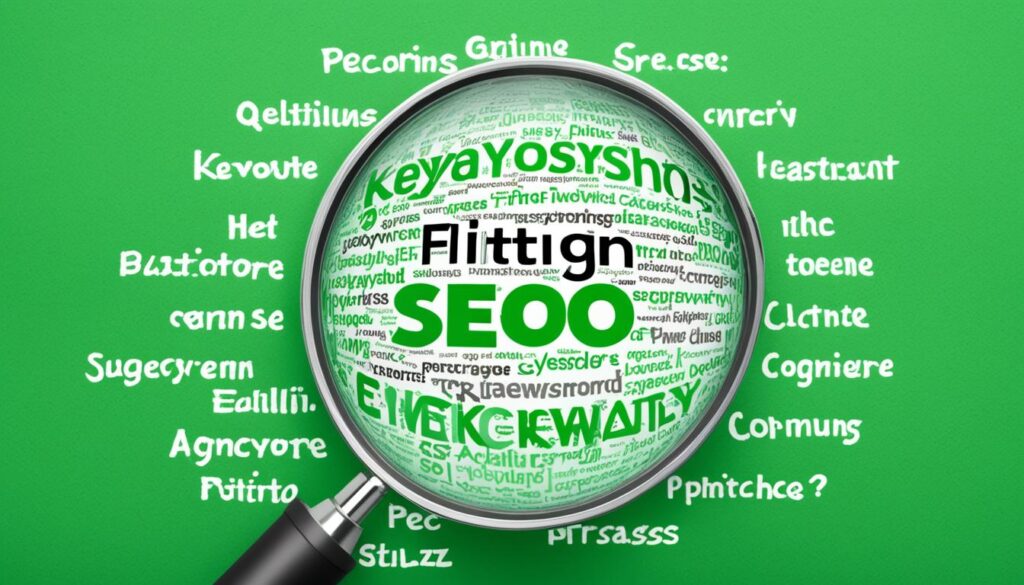
As a website owner, it is crucial to understand the importance of on-page SEO factors in optimizing your content for search engines. These factors play a significant role in improving your website's visibility and achieving better rankings in search engine results pages (SERPs).
On-page SEO involves implementing various strategies and techniques directly on your website to optimize its performance in SERPs. By optimizing your content according to on-page SEO best practices, you can ensure that search engines recognize the relevance and quality of your website's content, ultimately driving more organic traffic to your site.
Key Takeaways:
- On-page SEO factors are crucial for improving your website's visibility and rankings in search engine results.
- Implementing on-page SEO techniques ensures that your content stands out and attracts more organic traffic.
- Keyword optimization, content quality and relevance, and technical optimization are key aspects of on-page SEO.
- Understanding these factors and incorporating them into your website's optimization strategy can lead to better search engine rankings.
- Regularly monitoring and adjusting your on-page SEO efforts is essential to maintain and improve your website's visibility.
Importance of Keyword Optimization in On-Page SEO.
Keyword optimization plays a vital role in on-page SEO, driving organic traffic and improving search engine rankings. By conducting thorough keyword research, you can identify relevant keywords that align with your content and target audience's search queries. Integrating these keywords strategically into your meta tags, page titles, and heading tags signals to search engines the relevance and value of your content.
Using keywords thoughtfully throughout your content, including in the body text, headers, and image alt tags, can significantly enhance your chances of ranking higher in search engine results. However, it's crucial to strike a balance and maintain a natural approach to keyword usage. Avoid excessive keyword stuffing, as it can negatively impact your SEO efforts.
Effectively optimizing your content with relevant keywords can boost your visibility in search engine results, making your website more discoverable to your target audience.

The Role of Content Quality and Relevance in On-Page SEO.
In modern on-page SEO, the quality and relevance of your content play a crucial role in determining your search engine rankings. Search engine algorithms have evolved to prioritize high-quality, informative, and well-structured content that meets the needs and intent of users. Therefore, it is essential to create content that not only satisfies user queries but also provides value and engages your audience.
One of the key factors that search engines consider is the quality of your content. Content quality refers to the depth, accuracy, and usefulness of your content. By creating comprehensive and well-researched content, you can establish yourself as a credible source of information in your industry. This, in turn, can improve your visibility in search engine results and attract organic traffic to your website.
Another crucial aspect is content relevance. Search engine algorithms are designed to understand the context and intent behind user queries. By crafting content that is highly relevant to specific keywords and user queries, you increase your chances of ranking higher in search engine results pages (SERPs). Conducting thorough keyword research and strategically incorporating relevant keywords throughout your content can position your website as a valuable resource for users seeking information on specific topics.
However, content quality and relevance go beyond just using keywords. Search engine algorithms are becoming more sophisticated in analyzing user engagement metrics, such as time on page and bounce rate, to measure the quality and relevance of content. These metrics indicate how users interact with your content and whether it satisfies their needs. Highly engaging content that keeps users on your website for longer durations signals to search engines that your content is valuable and relevant to users.
Additionally, backlinks from reputable websites serve as a vote of confidence for your content's quality and relevance. When other websites link to your content, it signals to search engines that your content is trustworthy and worth recommending to users. Building a strong backlink profile can significantly impact your search engine rankings and increase the visibility of your content.
Content quality and relevance are key factors in on-page SEO. By creating high-quality, relevant, and engaging content and earning backlinks from reputable sources, you can improve your website's visibility in search engine results and attract organic traffic.

Key Takeaways:
- Content quality and relevance are crucial for on-page SEO success.
- Search engine algorithms prioritize informative, well-structured content that meets user intent.
- User engagement metrics, such as time on page and bounce rate, signal content quality and relevance.
- Backlinks from reputable websites enhance content credibility and visibility.
Technical Optimization for On-Page SEO Success.
When it comes to on-page SEO, technical optimization is a crucial aspect that should not be overlooked. By focusing on improving the technical performance of your website, you can enhance its visibility in search engine results and provide a seamless experience for your visitors.
One key factor to consider is website performance, which includes optimizing site speed and mobile-friendliness. A fast-loading website not only improves user experience but also signals search engines that your site is reliable and user-friendly. Additionally, ensuring that your website is mobile-friendly is essential, as more and more users are accessing the web through mobile devices.
Crawlability is another important aspect of technical optimization. It involves making your website easily accessible for search engine bots to crawl and index your content. By optimizing your website's structure, internal linking, and sitemap, you can ensure that search engines can effectively discover and index all of your web pages.
Implementing structured data markup is also crucial for technical optimization. By using standardized formats like Schema.org, you can provide search engines with additional information about your content, such as product details, reviews, and events. This helps search engines understand the context of your content and display rich snippets in search results, enhancing your website's visibility and click-through rates.
FAQ
What are on-page SEO factors?
On-page SEO factors are strategies and techniques that can be implemented directly on your website to optimize your content for search engines and improve your website's visibility in search engine results pages (SERPs).
Why is keyword optimization important in on-page SEO?
Keyword optimization is important in on-page SEO because it helps signal search engines about the relevance of your content to specific search queries. By conducting keyword research and strategically using relevant keywords in your meta tags, page titles, and headings, you can increase your chances of ranking higher in search engine results.
What role does content quality and relevance play in on-page SEO?
Content quality and relevance are paramount in on-page SEO. High-quality, informative, and well-structured content that satisfies user intent and provides value is more likely to rank higher in search engine results. User engagement metrics and backlinks from reputable websites also contribute to the assessment of content quality and relevance.
What is the importance of technical optimization in on-page SEO?
Technical optimization is crucial in on-page SEO as it focuses on improving the overall performance of your website. Factors such as site speed, mobile-friendliness, and crawlability are essential for search engines to effectively access and index your content. Optimizing technical aspects like implementing structured data markup and optimizing images can enhance user experience and improve your website's visibility in search engine results.
Source Links
- https://www.hulkapps.com/blogs/shopify-hub/does-shopify-bring-traffic-to-your-website-what-you-need-to-know
- https://www.hulkapps.com/blogs/shopify-hub/does-shopify-build-websites-unveiling-the-power-of-shopifys-web-building-capabilities
- https://techbullion.com/beyond-keywords-exploring-the-depth-of-seos-role-in-digital-marketing-strategies/











